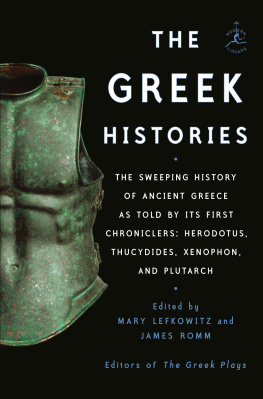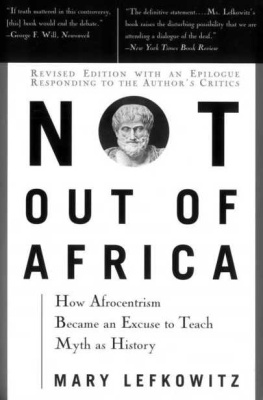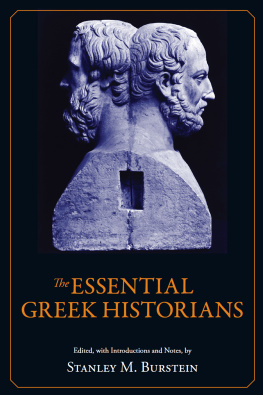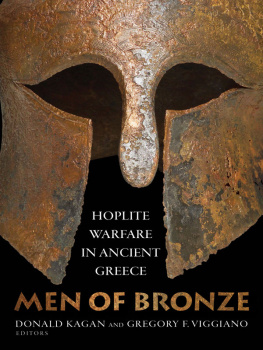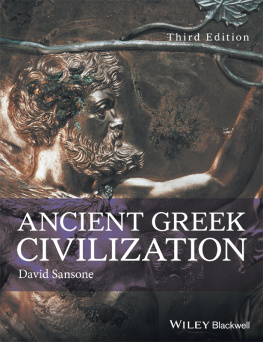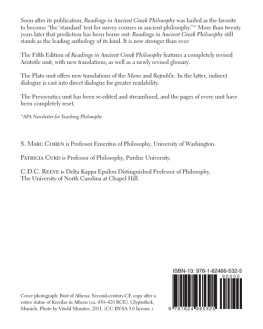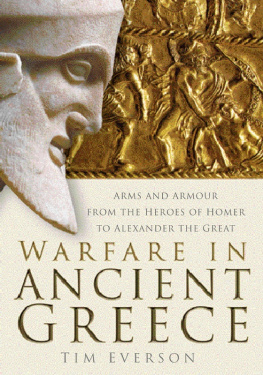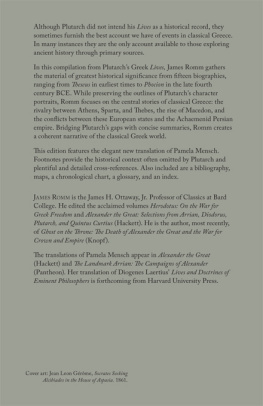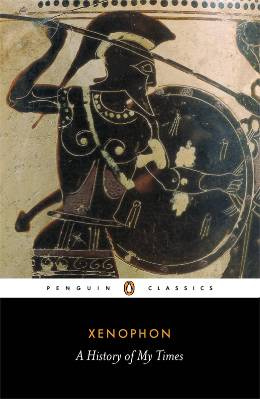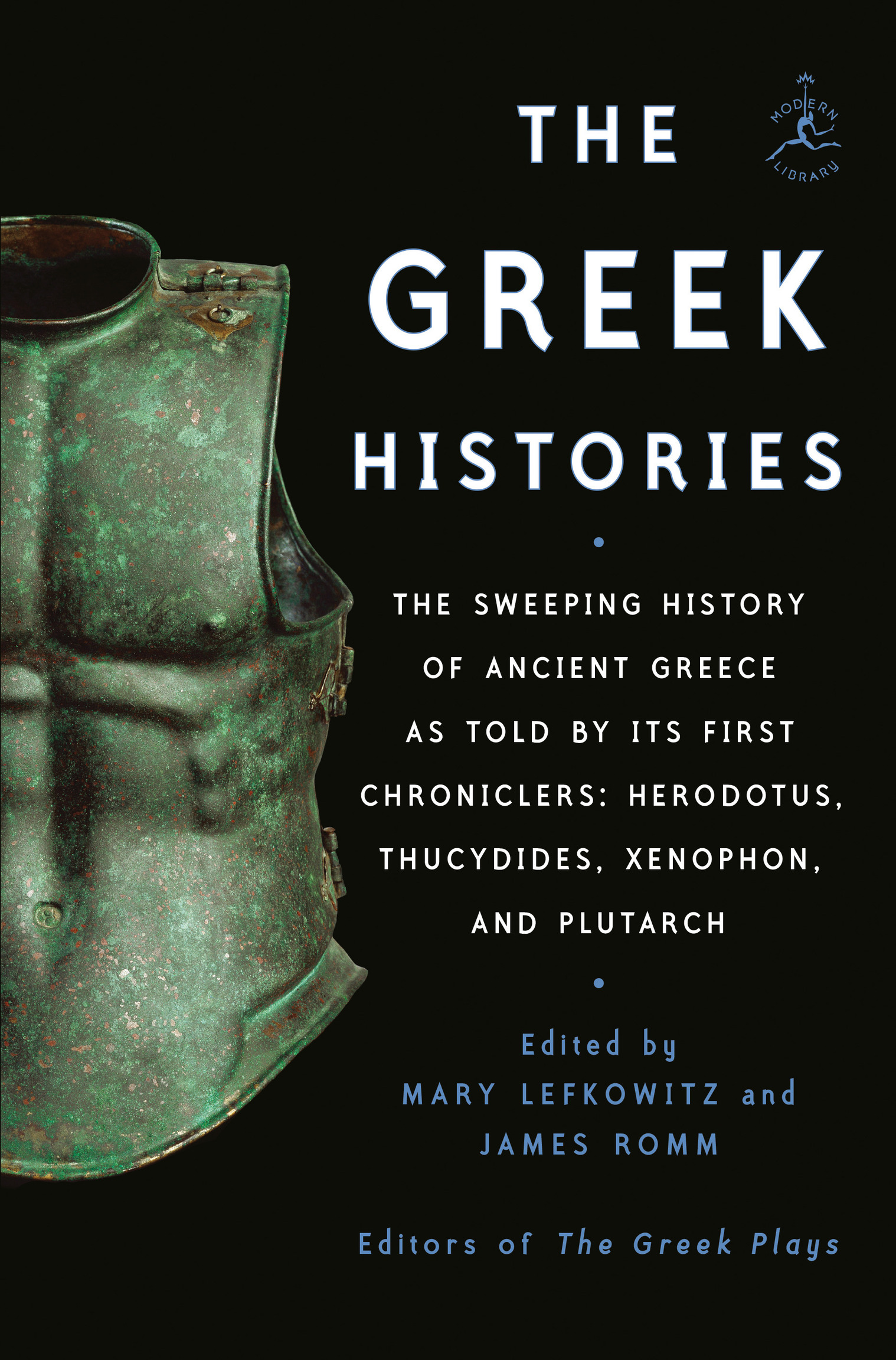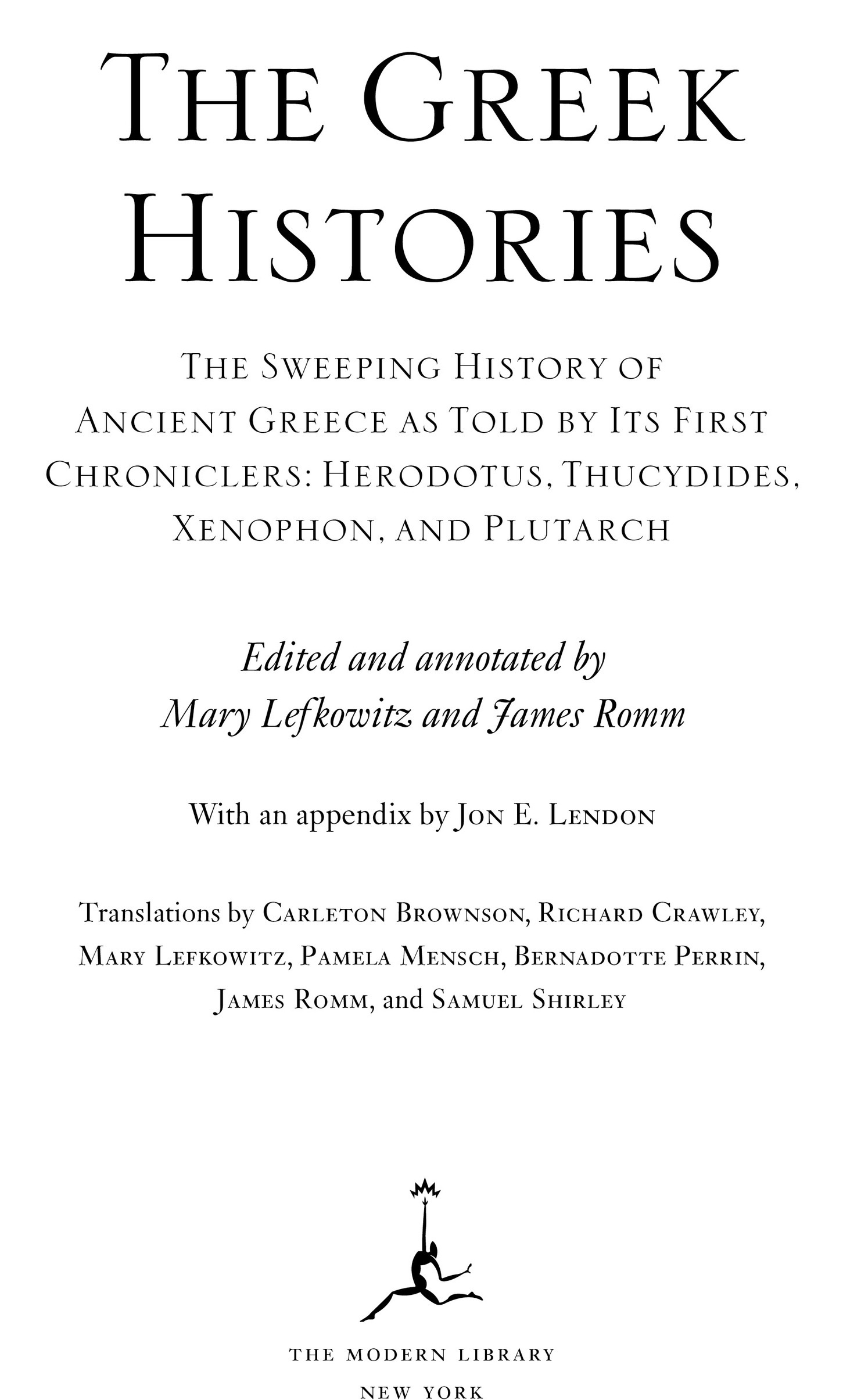Contents
Landmarks
Print Page List
Copyright 2022 by Mary Lefkowitz and James Romm
All rights reserved.
Published in the United States by The Modern Library, an imprint of Random House, a division of Penguin Random House LLC, New York.
The Modern Library and the Torchbearer colophon are registered trademarks of Penguin Random House LLC.
Grateful acknowledgment is made to Hackett Publishing Company, Inc., for permission to reprint excerpts from Lives that Made Greek History by Plutarch, translated by Pamela Mensch and edited with Introduction and Notes by James Romm, copyright 2012 by Hackett Publishing Company, Inc.; excerpts from On the War for Greek Freedom: Selections from the Histories by Herodotus, translated by Samuel Shirley, edited with Introduction and Notes by James Romm, copyright 2003 by Hackett Publishing Company, Inc. Reprinted by permission of Hackett Publishing Company, Inc. All rights reserved.
Library of Congress Cataloging-in-Publication Data
Names: Lefkowitz, Mary R., editor, translator. | Romm, James S., editor, translator. | Lendon, J. E., writer of appendix. | Mensch, Pamela, translator. | Perrin, Bernadotte, translator. | Shirley, Samuel, translator. | Herodotus. Works. Selections. English. | Thucydides. Works. Selections. English. | Xenophon. Works. Selections. English. | Plutarch. Works. Selections. English.
Title: The Greek histories: the sweeping history of Ancient Greece as told by its first chroniclers: Herodotus, Thucydides, Xenophon, and Plutarch / Edited and annotated by Mary Lefkowitz and James Romm; with an appendix by Jon E. Lendon; Translations by Carleton Brownson, Richard Crawley, Mary Lefkowitz, Pamela Mensch, Bernadotte Perrin, James Romm, and Samuel Shirley.
Description: New York: The Modern Library, 2022. | Includes index.
Identifiers: LCCN 2021016057 (print) | LCCN 2021016058 (ebook) | ISBN 9781984854308 (hardcover) | ISBN 9781984854315 (ebook)
Subjects: LCSH: HistoriographyGreeceHistoryTo 1500. | GreeceHistoryTo 146 B.C.Historiography.
Classification: LCC DF13 .G755 2022 (print) | LCC DF13 (ebook) | DDC 938.007202dc23
LC record available at https://lccn.loc.gov/2021016057
LC ebook record available at https://lccn.loc.gov/2021016058
Ebook ISBN9781984854315
modernlibrary.com
randomhousebooks.com
Cover photograph: Bridgeman Images
ep_prh_6.0_138967718_c0_r0
Contents
Introduction
Thats ancient history, someone might say today in dismissing a topic thats stale or irrelevant. But in fact ancient history is neither of those things. This volume was undertaken in the belief that the Greek historians are exciting to read in their own right; accessible to all, once certain obstacles have been overcome, and of great importance to us as we navigate our own times and our own historical evolution. They wrote for our benefit as much as for their readers (or, more accurately, listeners) in the classical Greek world or the high Roman Empire.
Thucydides, writing at the end of the fifth century BC , understood clearly that the story he toldthe war between Spartan and Athenian coalitions, what we know as the Peloponnesian Warwould provide paradigms for future ages. In his prologue he addressed those who wish to have an accurate knowledge of what happened and, because of human nature, will likely happen to be the same as, or similar to, these events. He would no doubt be pleased to know that his first English translator was Thomas Hobbes, the Enlightenment political philosopher who went on to write Leviathan and other influential works, including one entitled Human Nature; or that his book is still required reading at the West Point military academy; or that policy makers speak today of a Thucydides trap, in which an established superpower (as Sparta once was) feels it must fight to avoid being overtaken by a rival (like Athens). Thanks to its exploration of the deepest levels of human nature, the work has become what its author intendedan everlasting possession.
Human nature stands at the center not just of Thucydides work but of all Greek historical writing. Thus the Greek historians, in contrast to modern ones, weave speeches, conversations, and even, in one famous caseThucydides account of negotiations between Melos and Athensa dialogue into their narratives. These speech acts give us access to the minds and thoughts of historical actors, whether individuals or city-states (the latter can speak collectively through their ambassadors and envoys). They serve to put human beings, rather than impersonal or abstract forces, squarely at the center of historical change; they engage our emotions and our moral sense in the same way that the epic poems of Homer do, for indeed those poems, the Iliad in particular, were the primary model with which the first Greek historian, Herodotus, worked.
This centrality of speeches and conversations may surprise modern readers, who live in an age of audio recording devices and of careful documentation of quotes. When Herodotus reveals to us, in his very first episode, an exchange between a king and his chief bodyguard, held in a private room of a palace several centuries before his own time, we may feel that the rules of historical writing, as we understand them, are being broken. But Herodotus played by a different set of rules, as did his successors. In the next generation, Thucydides, writing about events of his own day, addresses the question of the veracity of his speeches, but even while acknowledging the validity of the question, he still claims the right to put words in peoples mouths based on what he thinks they ought to have said in particular situations.
Its hard to conceive of an ancient historical narrative without such inserted speeches and comments, just as its difficult to conceive of a modern one that has them. (An experiment of this kind, attempted several decades ago by a biographer of Ronald Reagan, featuring imagined dialogue that had not been recorded or witnessed, was met with widespread outrage and disdain.) This bright dividing line helps define larger differences in the ways ancient and modern historians conceived of their roles. Whereas todays historians seek the truth of facts, their ancient Greek counterparts sought the truth of story. They shaped the presentation of events to create unity and coherence, amplified crucial points by the inclusion (or, in some cases, invention) of speeches, and highlighted emblematic figures while ignoring those whose lives offered fewer insights. In some cases (as in those of Xenophon and Plutarch) they might shift focus toward leaders and states they considered admirable, giving their writing a strong moralistic or ethical slant. (Both Xenophon and Plutarch were students of moral philosophy as well as historical writers.)
Part of the moral dimension of these works is their awareness or inclusion of the gods, an element they share with Greek epic and tragic literature. Of the four authors presented in this volume, three show explicitly how the divine plays a role in the working out of human history, bringing low those who transgress or who strive for too much power. The fourth, Thucydides, avoids all direct reference to the gods and expresses skepticism about some aspects of traditional religion, but he hews so closely to tragic narrative patternsfor example, juxtaposing the greatest disaster that befell Athens, the defeat in Sicily, with the citys greatest moment of hubris, its annihilation of the population of Melosas to imply, perhaps, that divine forces operate even in his universe. Both he and Herodotus clearly learned much from the tragic playwrights whose works were first staged in their lifetimesAeschylus, Sophocles, and Euripides. (Sophocles in fact seems to have been a friend of Herodotus.) Xenophon too saw many of those plays performed, and he remained deeply convinced, as he says at one point, that the gods do not ignore the impious and those who commit impious acts (see ,

